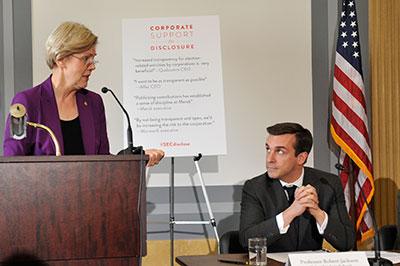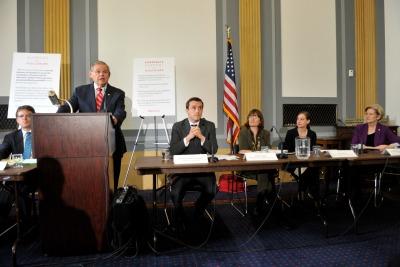Pushing the SEC to Shine Light on Corporate Political Spending
Columbia Law School Professor Robert J. Jackson Jr., Who Has Led Efforts to Require Publicly Traded Companies to Disclose their Spending on Politics, Briefs U.S. Senators in Washington
New York, October 31, 2013—Columbia Law School Professor Robert J. Jackson Jr., who has led the charge for new SEC rules requiring publicly traded companies to disclose their political spending, spoke about the proposed rule change with Senators Elizabeth Warren (D-Mass) and Robert Menendez (D-N.J.) at an Oct. 30 Senate briefing in Washington, D.C.
| Senator Elizabeth Warren (D-Mass) and Professor Robert J. Jackson Jr. at the briefing. |
The SEC’s consideration of the rule was prompted by a petition filed with the agency by a group of legal experts co-chaired by Jackson. The petition has garnered more supportive comments than any other rulemaking proposal in the agency’s history, and the SEC added the rule to its regulatory agenda last year. If promulgated, the rule would bring the reality of disclosure laws in line with the U.S. Supreme Court’s 2010 Citizens United decision, in which Justice Anthony Kennedy wrote that prompt disclosure would allow shareholders and voters to hold executives accountable for political spending. No mechanism currently exists to compel companies to disclose political spending.
“Shareholders want to know if the companies they invest in spend money on politics,” Jackson said at the hearing. “It is impossible for shareholders to hold corporate insiders accountable for political spending without transparency.”
Jackson also described why the arguments made by opponents of disclosure, who have pressured the SEC not to act, provide no reason for the SEC to remain silent. Opponents have argued, for example, that the SEC should stay away from rulemakings that might have political implications. “The SEC should not be deterred from giving investors the information they need because their actions might have consequences on Capitol Hill,” Jackson said.
|
Senator Robert Menendez (D-N.J.) speaks at the briefing. |
“Indeed, if the SEC chooses not to adopt disclosure rules because of its speculation about possible political effects, that choice—rather than the choice to adopt rules—would reflect impermissible consideration of politics. The SEC should focus on what investors want, not politicians,” Jackson said, “and when it does, it will find that the case for requiring disclosure of corporate political spending is strong.”
Senator Warren thanked Jackson and his co-petitioners for their “critical leadership on a fundamental issue.” Various news outlets covered the hearing, including The Hill, The Huffington Post, and Reuters.
Jackson is the Milton Handler Fellow at the Law School and the co-director of the Ira M. Millstein Center for Global Markets and Corporate Ownership. Before joining the faculty in 2010, he served as an advisor to senior officials at the Department of the Treasury and in the Office of the Special Master for TARP Executive Compensation.
In addition to Senators Warren and Menendez, other participants at the hearing included Patrick Doherty, director of corporate governance at the New York Comptroller’s Office, and Harvard Law School Professor John Coates The hearing was organized by Public Citizen, a nonprofit organization that works to ensure the interests of citizens are represented before Congress.

